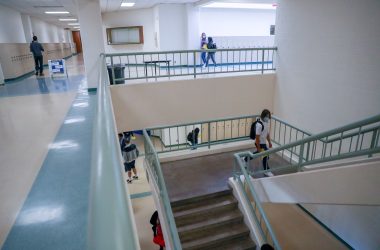
Kara Brown, Shaney Star, and Marianne Freeborn, of CASA of Marion County, prep for a child abuse prevention car parade at the Willamette Heritage Center on April 2, 2021. (Amanda Loman/Salem Reporter)
Soraida Cross attended dozens of nonprofit luncheons over the past sixteen years while employed in the local hospitality industry.
In December 2019, she was attending another luncheon as the General Manager of Phoenix Inn & Suites South Commercial, but instead of simply writing a check or becoming a sustaining member, she dove deeper, determined to become a local Court Appointed Special Advocate (CASA) volunteer for children in foster care.
“When you hear the statistics that a foster kid who has a CASA spends six months less time in foster care, and can save the system $18,000 dollars, and you hear how many kids don’t have a CASA, I decided I can do this,” Cross said. “I am going to be this kid’s person. I can make a difference.”
She followed up with Shaney Starr, CASA of Marion County Executive Director, and began the process to become a volunteer.
To raise awareness of CASA and the role they play in improving child welfare outcomes, Gov. Kate Brown proclaimed May 18th “Oregon CASA Volunteer Day.“ It’s the first such proclamation in Oregon, Starr said.
According to Starr, Oregon has over 2,200 CASA volunteers serving more than 5,500 children each year. Their dedication has had positive impacts on outcomes for children in addition to reducing time in foster care. For example, 92% of Oregon judges “agree” or “strongly agree” that children with a CASA experience better safety, permanency, and well-being outcomes than those without the help of a CASA, Starr said.
“Nationally, a youth with a CASA is more likely to stay in school, and experiences higher levels of hope than youth in foster care who do not have a CASA,” Starr said.
During the early months of 2020, Cross attended in person training which included court hearings. Training and being a CASA required 7-10 hours of volunteer time a week and could be flexed around her work schedule.
She received her first case in March of 2020 just as Oregon was shutting down for Covid precautions.
As her manager role slowed dramatically, having the volunteer work with CASA provided a focus that allowed her to positively move forward caring for kids in our community that desperately need an adult advocate representing them in the foster care team. The CASA is the only adult, other than the parents, in the hearings and discussion who is not being paid during the life of the case, which can last anywhere from a few months to a few years depending on its complexity.
For Cross, being an advocate is more about kids than numbers.
“Having kids is a reality check. It puts life into perspective. You don’t always have an opportunity to do something that’s all about someone else,” she said.
Bob Russell, who has been a CASA volunteer since October of 2020, did not have the luxury of pre-Covid in person training or watching a hearing in person prior to becoming a CASA. This has made advocacy more difficult.
Although he and all Marion County CASAs were able to meet with their kids and foster families in person throughout the pandemic, the court hearings have been audio only. He said it’s been difficult at times communicating your position for your child when you are unable to visually see the case workers, judges, and lawyers you are talking to and read the facial and body languages of those present.
Cross and Russell both caution that being a CASA might not be for everyone. If you have had a traumatic experience it might be triggered by what CASAs encounter in their cases. Some cases are heart breaking in the level of abuse to children a CASA might encounter. The ability to control emotions, think about what is in the best interest of the child, and communicate that during hearings to those who make the decisions requires a flexible yet organized mind.
Together, the three cases Cross and Russell have represented during COVID are all moving toward reunification, as most cases do.
“It’s very satisfying. There’s a sense of accomplishment when you’ve done something to improve a child’s life both in the short term and in the long term,” Russell said.
Jeanine Stice is a freelance writer based in Salem. Contact her at [email protected].
JUST THE FACTS, FOR SALEM – We report on your community with care and depth, fairness and accuracy. Get local news that matters to you. Subscribe to Salem Reporter starting at $5 a month. Click I want to subscribe!.









